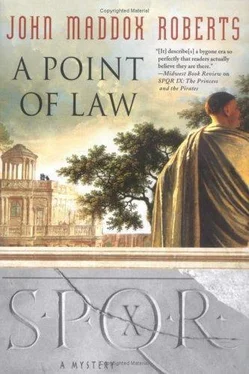John Roberts - A Point of Law
Здесь есть возможность читать онлайн «John Roberts - A Point of Law» весь текст электронной книги совершенно бесплатно (целиком полную версию без сокращений). В некоторых случаях можно слушать аудио, скачать через торрент в формате fb2 и присутствует краткое содержание. Год выпуска: 0101, ISBN: 0101, Издательство: St. Martin, Жанр: Исторический детектив, на английском языке. Описание произведения, (предисловие) а так же отзывы посетителей доступны на портале библиотеки ЛибКат.
- Название:A Point of Law
- Автор:
- Издательство:St. Martin
- Жанр:
- Год:0101
- ISBN:9780312337254
- Рейтинг книги:5 / 5. Голосов: 1
-
Избранное:Добавить в избранное
- Отзывы:
-
Ваша оценка:
- 100
- 1
- 2
- 3
- 4
- 5
A Point of Law: краткое содержание, описание и аннотация
Предлагаем к чтению аннотацию, описание, краткое содержание или предисловие (зависит от того, что написал сам автор книги «A Point of Law»). Если вы не нашли необходимую информацию о книге — напишите в комментариях, мы постараемся отыскать её.
A Point of Law — читать онлайн бесплатно полную книгу (весь текст) целиком
Ниже представлен текст книги, разбитый по страницам. Система сохранения места последней прочитанной страницы, позволяет с удобством читать онлайн бесплатно книгу «A Point of Law», без необходимости каждый раз заново искать на чём Вы остановились. Поставьте закладку, и сможете в любой момент перейти на страницу, на которой закончили чтение.
Интервал:
Закладка:
“A matter of an inheritance. Several heirs claiming to be the rightful owner, you know how it goes.”
“Alas, so I do.”
Back out in the street I checked the angle of the sun. Still plenty of daylight left.
“That was interesting,” I said, “but probably irrelevant. Let’s go see if the stone has any surprises for us.”
We went to the nearby quarter of the lapidaries. Most of the workers in precious substances lived and worked in the same small area near the eastern end of the Forum. Their shops were often located in the Forum itself, but I was looking for a dealer who traveled widely and bought from many sources; one who specialized in sapphires.
A bit of questioning led me to the shop of such a man, a resident alien named Gyges. Despite his Greek name he had a distinctly Syrian look, not an uncommon combination in the eastern coastal cities. I explained what I wanted, and he looked at the stone.
“The stone is from Egypt,” he said without hesitation. “Once it had a different shape, but it was cut down and polished flat to prepare it for this carving. That is done a great deal with Egyptian stones. Outside of Egypt, nobody much likes Egyptian jewels. Fortunately, they liked massive, irregular stones, so it is relatively easy to alter them for a more refined taste.”
“How old is it?” I asked. “I mean, when was this carving made? Can you tell?”
“It’s quite recent. This treatment of the hair-snakes, I should say-was first used by Eunostes of Caria no more than fifty years ago. But this wasn’t carved in Caria. The style is that of the Greek cities of southern Italy and Sicily. I am afraid I can’t name you a specific lapidary, but I am almost certain that this came from one of the workshops of Croton.”
Croton is in Bruttium, of course, but its inhabitants are not Bruttians: they are Greeks. Croton was the home of Pythagoras, who knew things about triangles and music and said people shouldn’t eat beans. It was also the home of a great Olympic champion named Milo around five hundred years ago. Lately the place didn’t amount to much.
“That doesn’t help us greatly,” Hermes said as we left.
“You never know what bit of information may come in useful,” I assured him. “Now for something that should be truly enlightening, let’s go find someone who can decipher these documents.”
Rome is full of Greek schoolmasters, most of them penurious. But I needed something better than a man who could drill well-born schoolboys in their alpha-beta-gamma or teach youths of senatorial families to repeat the speeches of Demosthenes. Nor did I want someone who had memorized the entirety of Homer. I spoke of this to Hermes.
“So what are we looking for?” he asked.
“A cipher is no more than a puzzle. Mathematicians like to solve puzzles. We need somebody who is both a Greek scholar and a mathematician.”
“I’m game. How do we find one?”
“Let’s go ask Asklepiodes. He knows the better-educated Greek community here in the City.”
It was not a great walk to the Temple of Aesculapius on Tiber Island. The streets were thinly populated because of the contio called by the Tribune Manilius. Those who had not gone to participate went there to watch.
The beautiful temple on its shiplike island was where Asklepiodes practiced and taught in the afternoons. We found him conducting an early evening sacrifice and waited respectfully with our heads covered while he finished the simple, dignified ceremony.
He smiled delightedly when he saw us. “Is someone else dead already?”
“Not this time,” I told him. When I explained what I needed, he shook his head in wonderment.
“Your activities are a source of unfailing marvel. Yes, I think I know exactly what you need. Callista is here from Alexandria, giving a course of lectures in the hall adjoining Pompey’s Theater.”
“Callista?” I said. “This is a woman?”
“Very much so. You have been to Alexandria. You are aware that female scholars and teachers are not at all uncommon there.”
“They rarely come to Rome to teach. You think she has the qualifications I need?”
“She is one of the foremost authorities on the Greek language working at the Library, and she is also a mathematician of the Archimedean school. I know of nobody else in Rome who enjoys such distinction.”
“I am pressed for time. Would it be excessively rude for me to call on her this evening?”
“Nothing easier,” he assured me. “I will take you there myself. It is a short walk from here, just on the other side of the bridge in the Trans-Tiber. And it will be no rudeness at all. In the Alexandrian fashion, she holds an open salon for persons of a scholarly bent. She should be receiving this evening.”
“Wonderful. Hermes, go tell my wife that I will be home late this evening, lest she think I’ve been waylaid and murdered. Tell her I am consulting with a Greek scholar. Don’t tell her that it is an Alexandrian woman. This is something I must explain to her in my own fashion. Then rejoin me at the house of Callista. If you run, you should be able to find it before it gets too dark to see.”
Asklepiodes explained to him how to find the house and we left the temple, crossing the bridge into the district across the river. A great many foreigners lived in the new district, finding it more congenial both as to accommodation and company. The City proper was crowded, expensive, and full of Romans.
The house of Callista was no more than a hundred paces beyond the bridge, a stroke of luck considering how late the hour was. The sun was almost on the western horizon, and most Romans were already arriving for their dinner engagements, unless the contio was running late.
The gatekeeper was not a slave chained to the doorpost as in a great Roman house, but rather an educated servant who recognized both Asklepiodes and my senatorial insignia in a flickering glance. He bowed deeply.
“Learned Doctor, noble Senator, welcome to the house of Callista. My lady entertains a small but distinguished company this evening. She will be so delighted that you have come.” He swept before us, and we followed him into a fine courtyard where perhaps ten people sat in a small group, their attention centered on a woman who sat on a small folding chair.
While the servant announced us, I studied the group and saw some faces I knew. Catullus the poet was there, as was Marcus Brutus. Brutus was a pontifex, and as a patrician he was barred from the contio that afternoon. He was known for his enthusiasm for Greek philosophy. The rest were men and women of Rome’s literary and philosophical community, both Romans and Greeks.
The woman herself rose to greet us. I had rather expected an overeducated crone, but she was a tall, stately woman with the handsome, slightly heavy features so favored by Greek sculptors. Her hair was purest black, divided in the middle and falling over her shoulders. Her gown was as simple and as beautiful as a Doric column. She took Asklepiodes’s hand first.
“Welcome, learned Asklepiodes, fountain of medical knowledge.” She turned to look at me. “Thrice welcome for bringing the famous Decius Caecilius Metellus the Younger to my house.” She released his hand and took mine. “I have hoped for so long to see you, Senator.” Her eyes were disconcertingly direct. Not to mention beautiful.
“I am amazed you even know my name, distinguished lady, and I apologize for arriving thus unannounced.”
She smiled and she did this, as she did everything else, beautifully. “Oh, but your all-too-brief stay in Alexandria is, shall we say, still remarked upon after nearly eleven years.”
“Oh, well,” I said, almost blushing, “what’s one more riot in Alexandria’s long history of them?” The riot had been the least of it.
Читать дальшеИнтервал:
Закладка:
Похожие книги на «A Point of Law»
Представляем Вашему вниманию похожие книги на «A Point of Law» списком для выбора. Мы отобрали схожую по названию и смыслу литературу в надежде предоставить читателям больше вариантов отыскать новые, интересные, ещё непрочитанные произведения.
Обсуждение, отзывы о книге «A Point of Law» и просто собственные мнения читателей. Оставьте ваши комментарии, напишите, что Вы думаете о произведении, его смысле или главных героях. Укажите что конкретно понравилось, а что нет, и почему Вы так считаете.









